Your Gastrointestinal cancer in cats images are ready. Gastrointestinal cancer in cats are a topic that is being searched for and liked by netizens today. You can Get the Gastrointestinal cancer in cats files here. Download all free vectors.
If you’re looking for gastrointestinal cancer in cats images information linked to the gastrointestinal cancer in cats topic, you have pay a visit to the right blog. Our website frequently provides you with suggestions for seeking the maximum quality video and picture content, please kindly hunt and find more enlightening video content and images that match your interests.
Gastrointestinal Cancer In Cats. They are usually in the small intestine with most occurring at the junction with the large bowel. Small cell also called low grade and Large cell also called high grade. In cats the most common intestinal cancer seen is lymphoma. Growling or rumbling sound in the stomach.
 Cancer In Cats Causes Symptoms Treatments Canna Pet From canna-pet.com
Cancer In Cats Causes Symptoms Treatments Canna Pet From canna-pet.com
A cat with stomach cancer rarely shows symptoms and therefore its diagnosis and treatment are difficult. The most common intestinal cancer in cats is lymphoma. Diarrhea could be bloody Difficulty pooping Of course if your cat has these symptoms it doesnt always mean intestinal cancer. Feeling of incomplete defecation. The majority 60 of the tumors are in the lower bowel the colon and rectum. Changing your cats diet can help it to feel better.
Adenocarcioma is a malignant tumor that may occur in the gastrointestinal GI system of a cat.
It can occur in any part of the GI system including the stomach the small and large intestine and the rectum. Feline GI lymphoma appears to occur as one of two major types with a portion of cats being affected by a more indolent small-cell lymphocytic form of lymphoma and others having a more aggressive large-cell lymphoblastic form of lymphoma. Grains and poultry can contribute to long-term inflammation please see food allergy articlesCats with intestinal lymphoma are often treated with. Anemia often caused by bleeding ulcers Bloody feces stools often appear very black like tar Dehydration. Leiomyosarcoma of Stomach Small and Large intestine in Cats Leiomyosarcoma is an uncommon cancerous tumor which in this case arises from the smooth muscles of the stomach and intestines. Feeling of incomplete defecation.
 Source: vcahospitals.com
Source: vcahospitals.com
Both forms of cancer are usually a non-Hodgkins lymphosarcoma. In cats the Siamese is nearly twice as likely to develop intestinal cancer as other cats and the incidence of adenocarcinoma is up to 8 times greater than in other breeds. They are usually in the small intestine with most occurring at the junction with the large bowel. Most symptoms are related to the gastrointestinal tract and may include. Symptoms of Stomach Cancer in Cats.
 Source: canna-pet.com
Source: canna-pet.com
Feline GI lymphoma appears to occur as one of two major types with a portion of cats being affected by a more indolent small-cell lymphocytic form of lymphoma and others having a more aggressive large-cell lymphoblastic form of lymphoma. In cats the most common intestinal cancer seen is lymphoma. Changing your cats diet can help it to feel better. Intestinal adenocarcinomas are biologically active cancer cells that originate from the glandular epithelial lining of the intestinal wall. Non-healing sores should also be investigated.
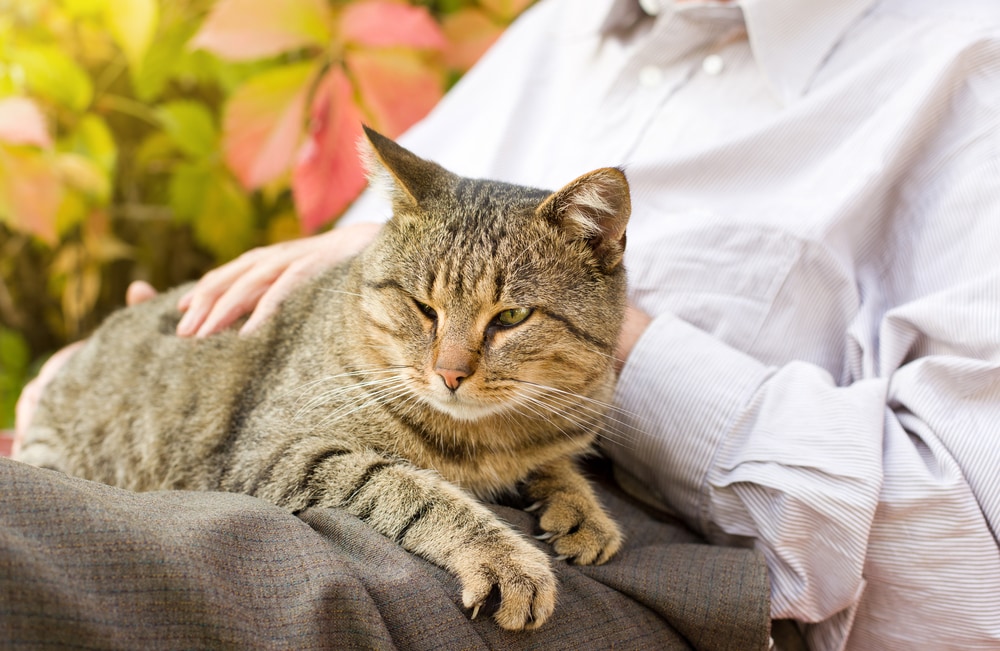 Source: petmd.com
Source: petmd.com
Typically the disease only appears in cats over six years of age but may be diagnosed in cats of any breed. While it can affect the entire body one type of feline lymphoma that affects the gastrointestinal tract is the most common making up approximately 23 of all cases. You should certainly take your cat to the vet if you have discovered a lump but not all lumps are cancers. The age range is 2-17 years. A vet will ask you questions about your cats health.
 Source: coralspringsanimalhosp.com
Source: coralspringsanimalhosp.com
Dogs and cats affected with this type of cancer often have a poor prognosis even with treatment. Feline GI lymphoma appears to occur as one of two major types with a portion of cats being affected by a more indolent small-cell lymphocytic form of lymphoma and others having a more aggressive large-cell lymphoblastic form of lymphoma. There are so many causes of GI upset in cats that we will just touch on some of the most common ones including intestinal parasites intestinal bacterial overgrowth IBO food allergiesintolerances inflammatory bowel disease IBD foreign bodies chronic constipation and cancer. Diet for Cats With Intestinal Lymphoma In addition to conventional cancer treatments it is very important to change the diet of these cats to an anti-inflammatory low-allergen diet. Growling or rumbling sound in the stomach.
 Source: youtube.com
Source: youtube.com
Feline GI lymphoma appears to occur as one of two major types with a portion of cats being affected by a more indolent small-cell lymphocytic form of lymphoma and others having a more aggressive large-cell lymphoblastic form of lymphoma. It is a very common cancer that affects cats with it making up approximately 30 of cancer diagnoses. The majority 60 of the tumors are in the lower bowel the colon and rectum. Some signs of intestinal cancer in cats to look out for are. There are two basic types of lymphoma.
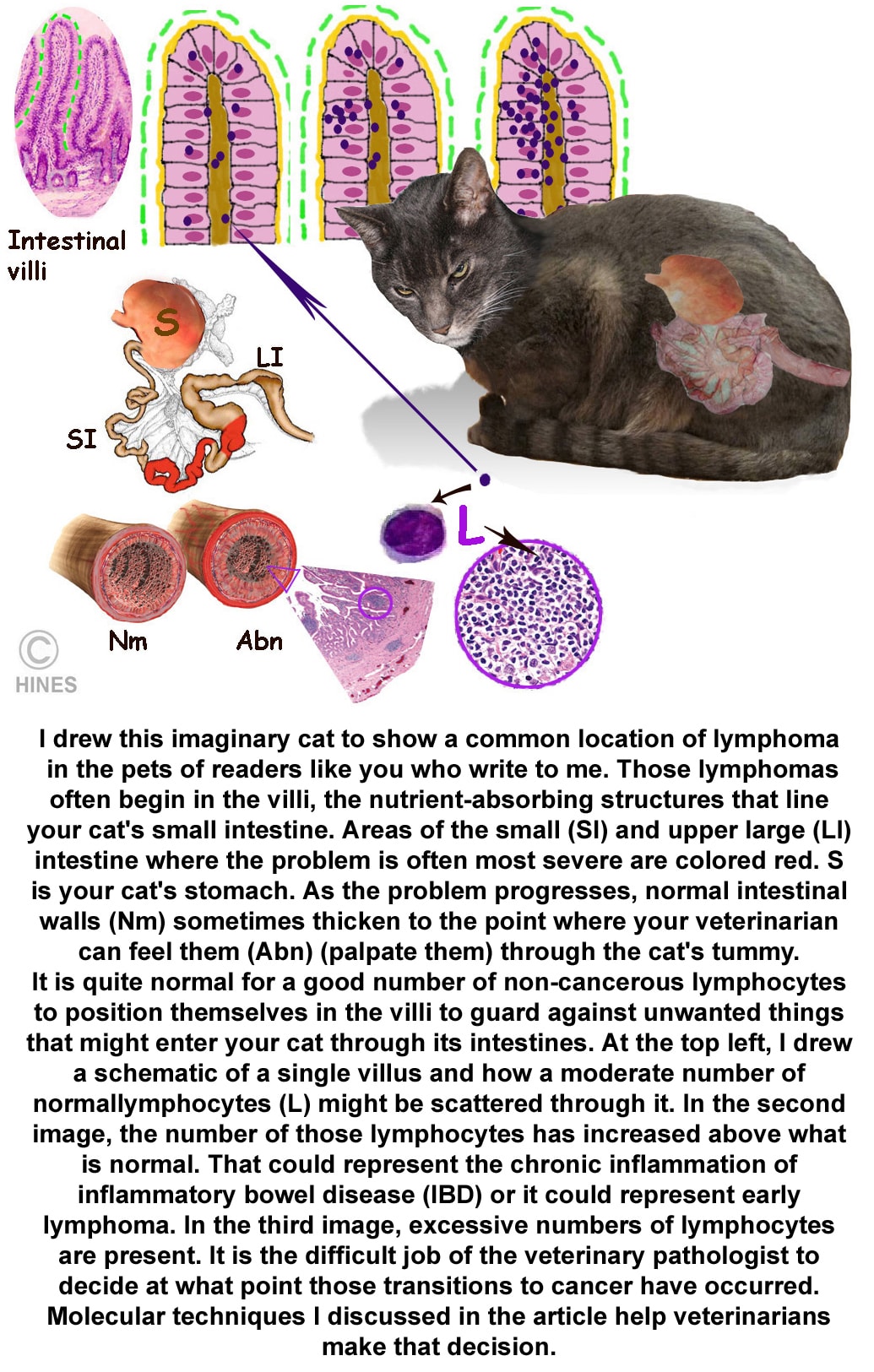 Source: vetspace.2ndchance.info
Source: vetspace.2ndchance.info
You should certainly take your cat to the vet if you have discovered a lump but not all lumps are cancers. Adenocarcioma is a malignant tumor that may occur in the gastrointestinal GI system of a cat. The age range is 2-17 years. There are two basic types of lymphoma. Several types of intestinal lymphoma exist including adenocarcinoma a malignant tumor in the gastrointestinal system and lymphosarcoma the most common type of intestinal cancer in cats.
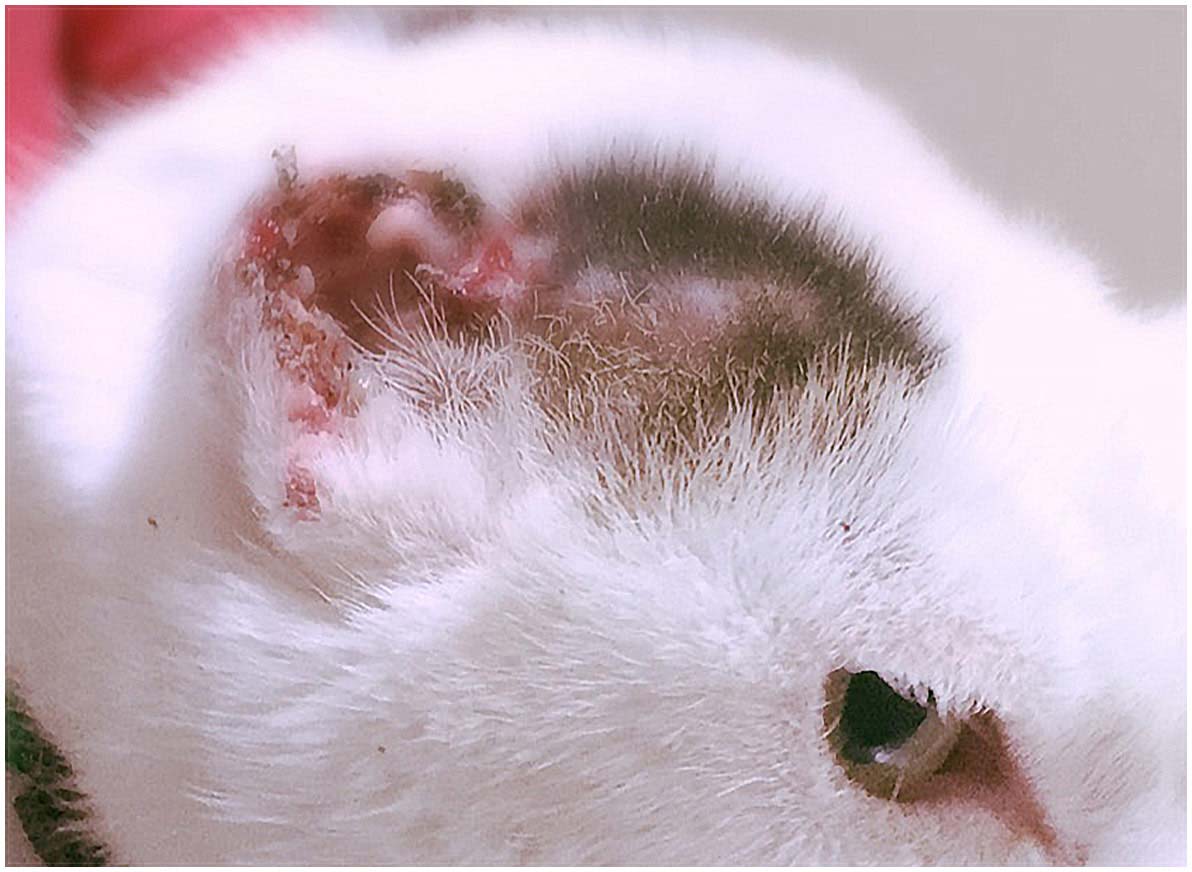 Source: southeasternvet.com.au
Source: southeasternvet.com.au
Several types of intestinal lymphoma exist including adenocarcinoma a malignant tumor in the gastrointestinal system and lymphosarcoma the most common type of intestinal cancer in cats. Intestinal adenocarcinomas are biologically active cancer cells that originate from the glandular epithelial lining of the intestinal wall. Frequent stomach problems. They are usually in the small intestine with most occurring at the junction with the large bowel. Cats tend to be good at hiding the fact they are in discomfort.
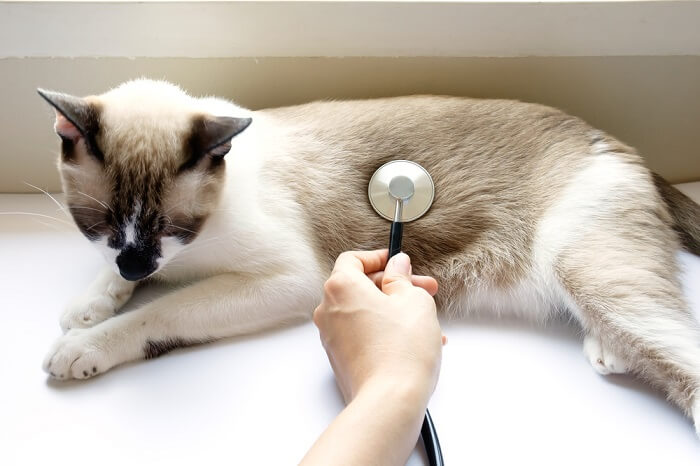 Source: allaboutcats.com
Source: allaboutcats.com
Anemia often caused by bleeding ulcers Bloody feces stools often appear very black like tar Dehydration. Some signs of intestinal cancer in cats to look out for are. Diarrhea could be bloody Difficulty pooping Of course if your cat has these symptoms it doesnt always mean intestinal cancer. Frequent stomach problems. The age range is 2-17 years.
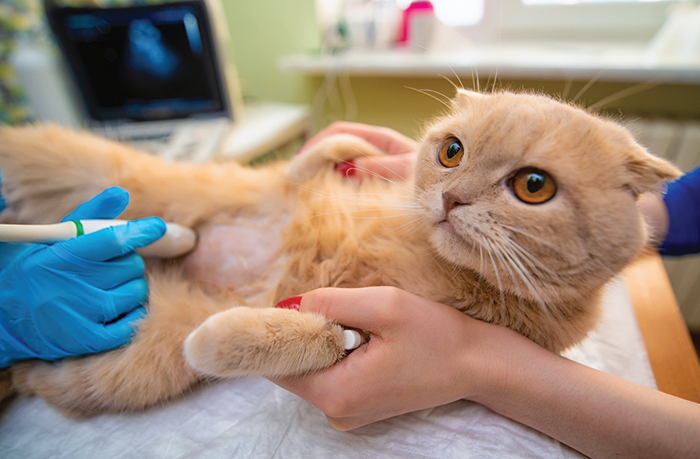 Source: catwatchnewsletter.com
Source: catwatchnewsletter.com
Grains and poultry can contribute to long-term inflammation please see food allergy articlesCats with intestinal lymphoma are often treated with. There are so many causes of GI upset in cats that we will just touch on some of the most common ones including intestinal parasites intestinal bacterial overgrowth IBO food allergiesintolerances inflammatory bowel disease IBD foreign bodies chronic constipation and cancer. Symptoms of Intestinal Cancer In Cats So how do you know if your cat has intestinal cancer. A cat with stomach cancer rarely shows symptoms and therefore its diagnosis and treatment are difficult. Grains and poultry can contribute to long-term inflammation please see food allergy articlesCats with intestinal lymphoma are often treated with.
 Source: southeasternvet.com.au
Source: southeasternvet.com.au
This tumor is rare in cats but when it does occur older cats are the most commonly affected. Vomiting could be bloody Reduced appetite and weight loss. Symptoms of Stomach Cancer in Cats. Small cell also called low grade and Large cell also called high grade. Growling or rumbling sound in the stomach.
 Source: canna-pet.com
Source: canna-pet.com
Symptoms of Intestinal Cancer In Cats So how do you know if your cat has intestinal cancer. Malignant tumors have the potential to spread to many areas of the body including lymph nodes other abdominal. It is a highly invasive intestinal cancer that causes severe illness and a low chance of survival. Diarrhea could be bloody Difficulty pooping Of course if your cat has these symptoms it doesnt always mean intestinal cancer. Frequent stomach problems.
 Source: canna-pet.com
Source: canna-pet.com
This extremely dangerous and painful disease affects mostly older cats more than six years old though all breeds are equally predisposed to leimyosarcoma. Some signs of intestinal cancer in cats to look out for are. In cats the Siamese is nearly twice as likely to develop intestinal cancer as other cats and the incidence of adenocarcinoma is up to 8 times greater than in other breeds. While it can affect the entire body one type of feline lymphoma that affects the gastrointestinal tract is the most common making up approximately 23 of all cases. Symptoms of Stomach Cancer in Cats.
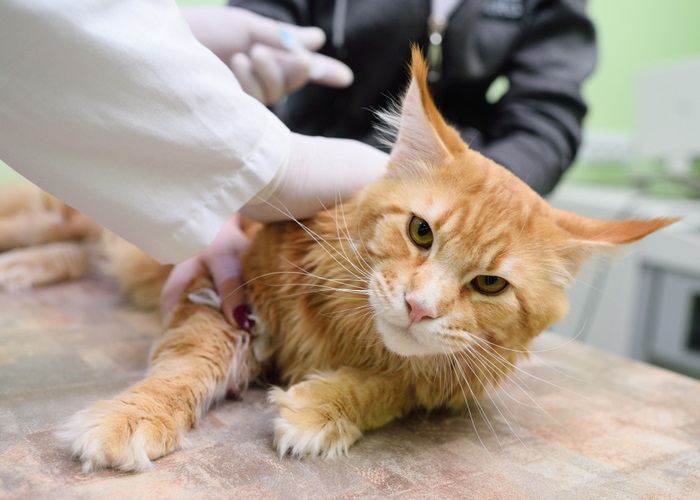 Source: allaboutcats.com
Source: allaboutcats.com
In fact 70 of small intestinal adenocarcinomas of cats occur in Siamese cats. This tumor is rare in cats but when it does occur older cats are the most commonly affected. It is a highly invasive intestinal cancer that causes severe illness and a low chance of survival. In cats the Siamese is nearly twice as likely to develop intestinal cancer as other cats and the incidence of adenocarcinoma is up to 8 times greater than in other breeds. Diet for Cats With Intestinal Lymphoma In addition to conventional cancer treatments it is very important to change the diet of these cats to an anti-inflammatory low-allergen diet.
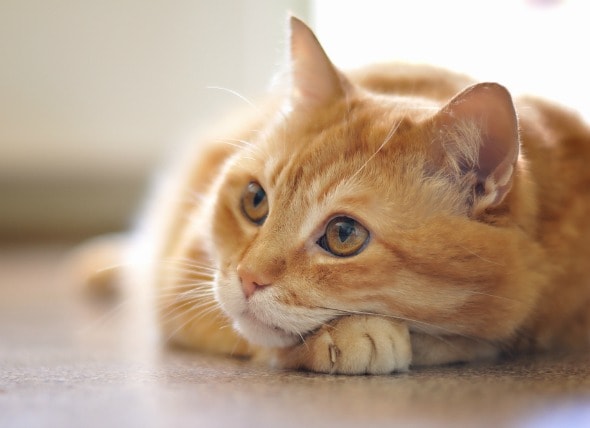 Source: petmd.com
Source: petmd.com
Dogs and cats affected with this type of cancer often have a poor prognosis even with treatment. No particular cat breed is known to be predisposed though it is more common in males than females. Symptoms of Stomach Cancer in Cats. Non-healing sores should also be investigated. Feeling of incomplete defecation.

Frequent stomach problems. Symptoms of Intestinal Cancer In Cats So how do you know if your cat has intestinal cancer. Frequent stomach problems. Diarrhea could be bloody Difficulty pooping Of course if your cat has these symptoms it doesnt always mean intestinal cancer. Other signs of tumours benign or cancerous affecting internal organs can include loss of appetite weight loss lethargy and weakness difficulty in breathing limping and recurrent digestive problems.
Source: encrypted-tbn0.gstatic.com
The most common intestinal cancer in cats is lymphoma. Malignant tumors have the potential to spread to many areas of the body including lymph nodes other abdominal. Some signs of intestinal cancer in cats to look out for are. Feline GI lymphoma appears to occur as one of two major types with a portion of cats being affected by a more indolent small-cell lymphocytic form of lymphoma and others having a more aggressive large-cell lymphoblastic form of lymphoma. There are two basic types of lymphoma.
 Source: canna-pet.com
Source: canna-pet.com
The majority 60 of the tumors are in the lower bowel the colon and rectum. It is a very common cancer that affects cats with it making up approximately 30 of cancer diagnoses. Most symptoms are related to the gastrointestinal tract and may include. The most common intestinal cancer in cats is lymphoma. In cats the tumors are rarer than in dogs but male cats and Siamese breeds are more at risk.
 Source: wikihow.com
Source: wikihow.com
Small cell also called low grade and Large cell also called high grade. Until the pain becomes severe you may not notice anything is wrong with your cat. Lymphosarcoma is associated with the feline leukemia virus. Very common in cats that go outside. Other signs of tumours benign or cancerous affecting internal organs can include loss of appetite weight loss lethargy and weakness difficulty in breathing limping and recurrent digestive problems.
This site is an open community for users to share their favorite wallpapers on the internet, all images or pictures in this website are for personal wallpaper use only, it is stricly prohibited to use this wallpaper for commercial purposes, if you are the author and find this image is shared without your permission, please kindly raise a DMCA report to Us.
If you find this site helpful, please support us by sharing this posts to your favorite social media accounts like Facebook, Instagram and so on or you can also save this blog page with the title gastrointestinal cancer in cats by using Ctrl + D for devices a laptop with a Windows operating system or Command + D for laptops with an Apple operating system. If you use a smartphone, you can also use the drawer menu of the browser you are using. Whether it’s a Windows, Mac, iOS or Android operating system, you will still be able to bookmark this website.







